Free E-Mail
Bible Studies
Beginning the Journey (for new Christians). en Español
Old Testament
Abraham
Jacob
Moses
Joshua
Gideon
David, Life of
Elijah
Psalms
Solomon
Songs of Ascent (Ps 120-135)
Isaiah
Advent/Messianic Scriptures
Daniel
Rebuild & Renew: Post-Exilic Books
Gospels
Christmas Incarnation
(Mt, Lk)
Sermon on the Mount
(Mt 5-7)
Mark
Luke's
Gospel
John's Gospel
7 Last Words of Christ
Parables
Jesus and the Kingdom
Resurrection
Apostle Peter
Acts
The Early Church
(Acts 1-12)
Apostle Paul
(Acts 12-28)
Paul's Epistles
Christ Powered Life (Rom 5-8)
1 Corinthians
2 Corinthians
Galatians
Ephesians
Vision for Church
(Eph)
Philippians
Colossians,
Philemon
1
& 2 Thessalonians
1 & 2 Timothy,
Titus
General Epistles
Hebrews
James
1 Peter
2 Peter, Jude
1, 2, and 3 John
Revelation
Revelation
Conquering Lamb of Revelation
Topical
Glorious Kingdom, The
Grace
Great Prayers
Holy Spirit, Disciple's Guide
Humility
Lamb of God
Listening for God's Voice
Lord's Supper
Names of God
Names of Jesus
Christian Art
About Us
Podcasts
Contact Us
Dr. Wilson's Books
Donations
Watercolors
Sitemap
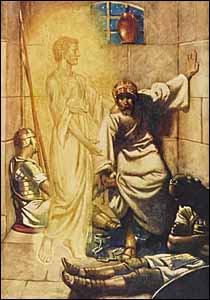 A. L. Noakes, 'Peter Delivered from Prison'. Larger image. |
Thus far, Peter's ministry has been powerful -- but so far mostly in the Roman Province of Judea. But that is about to change. Again, Satan sends powerful attacks against the church and Peter, its lead apostle. This time in the form of a powerful king.
Herod Agrippa (ruled 37 to 44 AD)
Herod Agrippa I, considered the bad sheep of the Herodian family, emerges as one of the dynasty's most powerful kings. Growing up in Rome, he becomes friends with several powerful men who become emperors, and falls in and out of favor. Beginning in 37 AD, his lands grow rapidly to include Galilee, Samaria, Judea, and considerably more. At his death in 44 AD, Herod Agrippa is one of the most powerful kings of the east and rules over a similar amount of territory as had his grandfather Herod the Great.366]
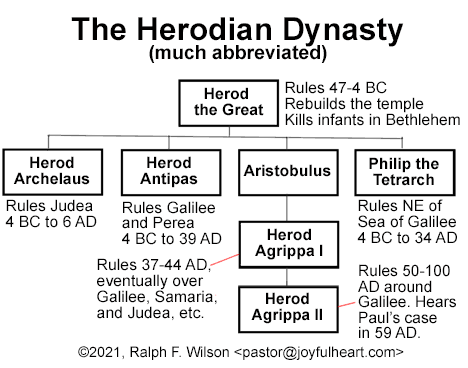 Where Herod Agrippa I fits in with the rest of the Herodian Dynasty. Larger chart. |
The Jews like Herod Agrippa better than the other Herods, probably because he is zealous for Judaism. For example, he sought to prevent Emperor Caligula (ruled 37-41 AD) from setting up his statue in the temple in Jerusalem. But he appears to history as a self-serving scoundrel and opportunist. To gain favor with the Jews, he begins a new persecution of the church in Jerusalem.
Herod Kills the Apostle James (Acts 12:1-2))
"1 It was about this time that King Herod arrested some who belonged to the church, intending to persecute them. 2 He had James, the brother of John, put to death with the sword." (Acts 12:1-2)
Three prominent men are named James in the New Testament:
- James the half-brother of Jesus, who assumes leadership in the Jerusalem church and wrote the Letter of James in our New Testament. He is also known as James the Just.
- James the Apostle, the son of Alphaeus, another of the original 12 apostles. He is also known as James the Lesser.367
- James the Apostle, son of Zebedee the fisherman, is one of Jesus' earliest disciples, and along with his sibling John the Apostle, these brothers are known as the "Sons of Thunder."†He is one of Jesus' inner circle -- Peter, James, and John. He is the one Herod executes.
Herod Agrippa is named King of Judea by Roman Emperor Claudius in 41 AD. James' execution apparently takes place in Jerusalem shortly thereafter. As king, Agrippa is not bound by the rules the Romans placed on the Jewish Sanhedrin limiting use of the death penalty. By killing James and Peter, Agrippa is seeking to please the Jewish leaders by decapitating the church's leadership -- literally -- and severely crippling the growing Christian movement.
10.1 Peter's Imprisonment and Deliverance (Acts 12:1-17)
"3 When he saw that this pleased the Jews, he proceeded to seize Peter also. This happened during the Feast of Unleavened Bread. 4 After arresting him, he put him in prison, handing him over to be guarded by four squads368 of four soldiers each. Herod intended to bring him out for public trial after the Passover.369 5 So Peter was kept in prison, but the church was earnestly praying370 to God for him." (Acts 12:3-5)
Peter's Escape from Prison (Acts 12:6-17)
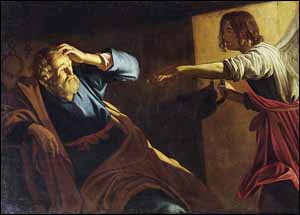 Gerard van Honthorst, 'St. Peter's Release from Prison by the Angel' (1616-18), oil on canvas, 50.7 x 70.4 in., Staatliche Museen zu Berlin, Germany. Larger image. |
The storyteller describes prison security.
"The night before Herod was to bring him to trial, Peter was sleeping between two soldiers, bound with two chains, and sentries stood guard at the entrance." (Acts 12:6)
Now an angel intervenes, giving patient instructions to the sleep-dazed prisoner who can't quite make sense of what is going on. Chains fall off, doors open.
"7 Suddenly an angel of the Lord appeared and a light shone in the cell. He struck Peter on the side and woke him up. 'Quick, get up!' he said, and the chains fell off Peter's wrists.
8 Then the angel said to him, 'Put on your clothes and sandals.' And Peter did so. 'Wrap your cloak around you and follow me,' the angel told him. 9 Peter followed him out of the prison, but he had no idea that what the angel was doing was really happening; he thought he was seeing a vision. 10 They passed the first and second guards and came to the iron gate leading to the city. It opened for them by itself, and they went through it. When they had walked the length of one street, suddenly the angel left him." (Acts 12:7-10)
Only in the chill of the early morning does Peter realize that this isn't a dream or vision after all. He is free!
"Then Peter came to himself and said, 'Now I know without a doubt that the Lord sent his angel and rescued me from Herod's clutches371 and from everything the Jewish people were anticipating.'" (Acts 12:11)
Peter heads to the home where he knows people will be gathered praying for him.
"12 When this had dawned on him, he went to the house of Mary the mother of John, also called Mark, where many people had gathered and were praying. 13 Peter knocked at the outer entrance, and a servant girl named Rhoda came to answer the door. 14 When she recognized Peter's voice, she was so overjoyed she ran back without opening it and exclaimed, 'Peter is at the door!'" (Acts 12:12-14)
Rhoda (whose name means "rose") is a slave-girl372†appointed to watch the door or gate. She is owned ironically by a wealthy Jewish Christian believer, John Mark's mother Mary. Rhoda is so beside herself with joy that she forgets to let Peter in. Instead, she runs inside and blurts out that Peter is outside. They don't believe her.
"'You're out of your mind,' they told her. When she kept insisting that it was so, they said, 'It must be his angel.'" (Acts 12:15)
The humor of this story isn't lost on Luke -- or us. They have been praying fervently for Peter's release, and when their prayers are miraculously answered, they can't believe it.†Rather than believe God has answered prayer, they tell the slave girl that she's crazy373 and then they come up with the "angel theory," in this case, a guardian angel capable of assuming the bodily appearance of the one he was protecting.374 Inside they argue, but Peter persistently knocks (quietly, I am sure) until someone lets him in.
"16 But Peter kept on knocking, and when they opened the door and saw him, they were astonished. 17 Peter motioned with his hand for them to be quiet and described how the Lord had brought him out of prison. 'Tell James and the brothers375 about this,' he said, and then he left for another place.'" (Acts 12:16-17)
Peter relates the story with all its amazing details. "Tell James," he says, referring to Jesus' half-brother James who has become the recognized leader of the Jerusalem church.376 Exactly where he went, this "other place," we don't know. Herod's prison guards don't fare well. They are executed.
Herod Agrippa dies in Caesarea in 44 AD (Acts 12:20-23). Subsequently, Emperor Claudius reduces Herod's territories to the status of a Roman province, since Herod's son is only 17 at the time.377 Now that Herod is dead, Peter is no longer in immediate danger from Herod or his family and is able to travel freely in Judah and Galilee.
Q53. (Acts 12:6-17) What does this teach us about Peter? About the extent of God's power? About prayer? About our level of faith as we pray for impossible things?
10.2. Rejoicing in Suffering (1 Peter 1:3-9)
Fast-forward a quarter century or so, and Peter is writing to a church still undergoing persecution, this time from Emperor Nero and his underlings.
We see two seemingly contradictory concepts -- rejoicing and suffering grief:
"In this you greatly rejoice, though now for a little while you may have had to suffer grief378 in all kinds of trials.379 These have come so that your faith -- of greater worth than gold, which perishes even though refined by fire -- may be proved genuine and may result in praise, glory and honor when Jesus Christ is revealed." (1 Peter 1:6-7)
The joy of our life in Christ is tempered by "grief" (NIV) or "heaviness" (KJV) by the various troubles of this life -- both the normal problems of life that all people face, as well as the persecutions we may face as Christians. Of course, God doesn't tempt us with evil (James 1:12-14). But he does allow circumstances that stretch our faith and force us to grow.
Peter compares this spiritual growth to the smelting process by which metals are purified. In ancient days, silver or gold ore was melted in a crucible. The weight of gold and silver atoms causes them to settle to the bottom, while other molten elements (the dross) separate from the heavy metal and rise to the surface where they are skimmed off. This heating and skimming process is repeated many times until the gold or silver is pure. Only then is it allowed to cool fully and be formed into ingots or jewelry of great value. Unrefined ore has value only in its potential; but refined precious metals are ready to use.
"These [trials] have come so that your faith -- of greater worth than gold, which perishes even though refined by fire -- may be proved genuine380 and may result in praise, glory and honor when Jesus Christ is revealed" (1 Peter 1:7).
Ultimately, not even gold will endure (2 Peter 3:12) -- only genuine, tested, purified faith that will bring great glory and honor to Jesus when he returns.
"Though you have not seen him, you love him; and even though you do not see him now, you believe in him and are filled with an inexpressible381 and glorious382 joy, for you are receiving the goal of your faith, the salvation of your souls" (1 Peter 1:8-9).
Peter is marveling at the joy inspired in the hearts of believers. This isn't emotionalism -- something artificially worked up by oneself or by a skillful manipulator of people -- but an emotion, a joy prompted by a faith-vision of God himself. Part of that salvation and freeing work of Christ in my soul is to be experienced and enjoyed now, even though it is a brief glimpse or earnest or taste of what it will be like in heaven.383
Growth Despite Persecution (Acts 12:24)
Back to the account of Peter's ministry in Acts. Luke recounts Herod's eventual death, and closes the chapter with these words.
"But the word of God continued to increase and spread."384†(Acts 12:24)
Despite the growing pains of including Gentiles in what had been an exclusively Jewish church. Despite the focused attempt by a powerful king to destroy the church's leadership, the gospel prevails. It doesn't merely survive, it flourishes.
10.3. Peter in Antioch
An example of this growth is when Saul's persecution scatters believers all over the eastern Mediterranean. Because of persecution, the Gospel advances.
"19 Now those who had been scattered by the persecution in connection with Stephen traveled as far as Phoenicia, Cyprus and Antioch, telling the message only to Jews. 20 Some of them, however, men from Cyprus and Cyrene, went to Antioch and began to speak to Greeks also, telling them the good news about the Lord Jesus. 21 The Lord's hand was with them, and a great number of people believed and turned to the Lord." (Acts 11:19-21)
Now the gospel catches fire among the Greek-speaking Gentiles in Antioch in a big way. Thousands are coming to Christ, creating a mass of believers that begins to rival the size of the church of Jerusalem.
Antioch of Syria
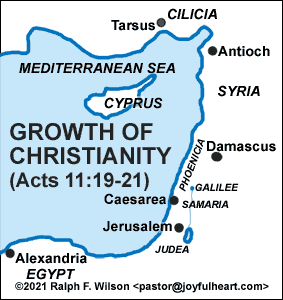 Expansion of the Church to Antioch. Larger map. |
Along the banks of the Orontes River, ancient Antioch's ruins lie near the modern city of Antakya, Turkey. Established by the Seleucids about 350 BC, by Peter's time Antioch was the third most important city in the Roman Empire, capital of the Roman province of Syria, with a population of perhaps half a million, many times larger than Jerusalem. A sizeable revival here has huge implications for the entire Roman Empire. Within a few years, Antioch becomes the mother church for a series of missions to the Roman world.
The year is probably 45 AD. The Jerusalem Church sends Barnabas to help shepherd the revival movement (Acts 11:22-24). Immediately, Barnabas sends for Paul to help him, living in his home city of Tarsus (Acts 11:25-26).
Peter's Hypocrisy in Antioch (Galatians 2:11-14)
Reports of the tremendous revival in Antioch attract a good deal of attention from various travelling prophets and teachers (Acts 13:1) who come to see what the Lord is doing there. One of these is Peter.
But Peter's visit to Antioch gets off to a bad start. As Paul explains in hid letter to the Galatian church:
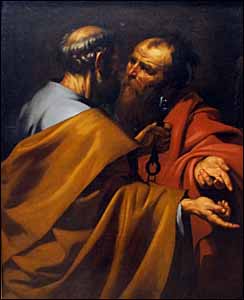 Jusepe de Ribera, 'The Dispute at Antioch -- Saints Peter and Paul' (1612), oil on canvas, 47.5 x 37.8 in., Metropolitan Museum of Art. |
"11 When Peter came to Antioch, I opposed him to his face, because he was clearly in the wrong. 12 Before certain men came from James, he used to eat with the Gentiles. But when they arrived, he began to draw back and separate himself from the Gentiles because he was afraid of those who belonged to the circumcision group. 13 The other Jews joined him in his hypocrisy, so that by their hypocrisy even Barnabas was led astray.
14 When I saw that they were not acting in line with the truth of the gospel, I said to Peter in front of them all, 'You are a Jew, yet you live like a Gentile and not like a Jew. How is it, then, that you force Gentiles to follow Jewish customs?'" (Galatians 2:11-14)
Sometimes we are surprised and shocked that Christians -- even Christian leaders -- can be inconsistent and blind. Sometimes they need and deserve a rebuke.
You'll recall Peter's noontime vision on the roof of the house of Simon the Tanner. Peter sees a sheet let down from heaven with unclean animals, but the voice says, "Get up, Peter, kill and eat." Peter goes to Cornelius's house and declares, "God has shown me that I should not call any man impure or unclean" (Acts 10:28).
However, this same Peter finds strict Jewish Christians in Antioch who object to his close fellowship with new Gentile believers. So Peter makes it a point when around these Jews not to have table fellowship -- that is, eat with -- the new Gentile Christians. So important is Peter's example that even Barnabas starts to imitate him.
Paul is livid!
Peter is weak. He wants to be liked, to impress these Jerusalem Jewish Christians, so he goes against what God has taught him.385 If this were to continue, it would severely damage the revival taking place in Antioch, so Paul is right to challenge it publicly. And it stops. Peter accepts the rebuke.
This incident with Peter in Antioch must have taken place about 48 AD, or a bit before, since that year Paul writes his Letter to the Galatians describing the incident. It probably precedes the Council of Jerusalem in 49 AD, where the issues of table fellowship between Jews and Gentiles are clarified by an apostolic letter.386
As I reflect on it, I learn that Peter -- even the now mature super apostle Peter -- can make mistakes. He -- and we -- have a need for humility so that we can be corrected when we are wrong. Especially when we are successful, we can become so arrogant that we reject any criticism. To Peter's credit, he apparently accepts Paul's rebuke and apparently goes on to have a considerable ministry in Antioch, as we'll see in Lesson 11.1.
This is a cautionary tale for all successful Christian leaders. Even mature Christians can be blind to our flaws. The people who surround us may overlook them or cover them up. My friends, if God has blessed you with success in ministry, take care to foster special humility so that you can see your own faults.
Q54. (Galatians 2:11-14) What does this teach us about Peter? About Paul? About our need for humility as Christian leaders?
10.4. Peter's Word at the Council of Jerusalem (Acts 15:1-29)
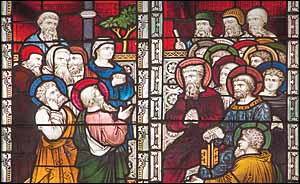 'St Paul on the Council at Jerusalem' (late 19th century), stained glass, All Saints' Anglican Church, Rome, designed by Clayton and Bell, London. |
This pernicious influence of the strict Jewish Christians from Jerusalem continues to cause problems in Antioch and elsewhere.
Danger from Judaizers
"Some men came down from Judea to Antioch and were teaching the brothers: 'Unless you are circumcised, according to the custom taught by Moses, you cannot be saved.'" (Acts 15:1)
In other words, you have to become a full Jew before you can be saved as a Christian. And to become a full Jew, you go through various steps (such as circumcision) and take upon you various obligations (to obey the Mosaic law). People who teach this are called "Judaizers."
Change is hard When we understand something one way, we often try to force everything into the same rigid category. But the gospel of grace isn't a good fit for a religion of law. Jesus predicts this reaction.
"37 No one pours new wine into old wineskins. If he does, the new wine will burst the skins, the wine will run out and the wineskins will be ruined. 38 No, new wine must be poured into new wineskins. 39 And no one after drinking old wine wants the new, for he says, 'The old is better.'" (Luke 5:37-39)
In this case, the old is not better! And it is not "good" news! It is legalism, not grace.
James and the mother church in Jerusalem are partly to blame for this. They don't actively teach this legalism, but they tolerate the Judaizers, "the circumcision party," and, as a result, the problem gets out of hand.
Paul and Barnabas, who are currently residing in Antioch after their First Missionary Journey feel that the problem must be confronted head on. So about 49 AD, the Antioch church sends them to Jerusalem to force clarification of the issue.
"Paul and Barnabas were appointed, along with some other believers, to go up to Jerusalem to see the apostles and elders about this question." (Acts 15:2)
When they reach Jerusalem, the apostles and elders convene a meeting to discuss it.
"Some of the believers who belonged to the party of the Pharisees stood up and said, 'The Gentiles must be circumcised and required to obey the law of Moses.'" (Acts 15:5)
There is considerable debate.
Peter's Testimony to the Council of Jerusalem (Acts 15:7-11)
Next, Peter stands to address the gathering, pointing to his own experience with the Holy Spirit coming upon the Gentiles at the house of Cornelius in Caesarea (Acts 10-11, Lesson 9.5).
"7 Brothers, you know that some time ago
God made a choice among you that the Gentiles might hear from my lips
the message of the gospel and believe.
8 God, who knows the heart, showed that he accepted them by giving
the Holy Spirit to them, just as he did to us. 9 He made no
distinction between us and them, for he purified their hearts by faith. 10
Now then, why do you try to test God by putting on the necks of the
disciples a yoke that neither we nor our fathers have been able to bear?
11 No! We believe it is through the grace of
our Lord Jesus that we are saved, just as they are." (Acts 15:7--11)
Peter's testimony and argument at the Jerusalem Council emphasizes God's choice and his manifest grace.
- God's initiative. God himself directs Peter to preach to the Gentiles at Caesarea (verse 7; Acts 10:5, 20).
- Visible acceptance. God indicates his acceptance of the Gentiles by pouring out the Holy Spirit on them (verse 8; Acts 10:44-47).
- Faith. God shows no distinction between Gentile or Jew, but accepts their faith (verse 9)
- Testing God. Requiring circumcision and the yoke of the law for salvation when God has shown that he already accepts the Gentiles is testing God, rebelling against him, that is, denying what God has made obvious (verse 10)
- Grace. Both Jews and Gentiles are saved by the Lord's grace (verse 11)
We'll come back to themes of faith and grace in a moment.
After Peter's testimony, Barnabas and Paul speak.
"The whole assembly became silent as they listened to Barnabas and Paul telling about the miraculous signs and wonders God had done among the Gentiles through them." (Acts 15:12)
James' Summation (Acts 15:12-29)
James the Just, Jesus' brother, is the lead pastor in Jerusalem. After hearing the dispute, Peter's words, and the testimony of Paul and Barnabas, he summarizes what God seems to be saying to the assembled body. He cites Amos 9:11-12 to the effect that the Gentiles are included among God's people (Acts 15:16-18). Then he gives his own opinion about what they should do.
"19 It is my judgment, therefore, that we should not make it difficult for the Gentiles who are turning to God. 20 Instead we should write to them, telling them to abstain from food polluted by idols, from sexual immorality, from the meat of strangled animals and from blood. 21 For Moses has been preached in every city from the earliest times and is read in the synagogues on every Sabbath." (Acts 15:19-21)
James' summary of rules to impose on Gentiles arises not so much from the Law as from pragmatic peacemaking in a Church that increasingly has to accommodate people from both Jewish and Gentile backgrounds without offending each other.
- Abstain from food polluted by idols. Often, the meat sold in shops has been ritually offered to a god before it is sold.
- Abstain from blood. Eating blood is not uncommon in the Greek-speaking world, but is offensive to Jews because of clear prohibitions in the Law.387
- Abstain from the meat of strangled animals. To strangle the animal would leave the blood in the meat. Unless there are Jewish butchers in the Greek cities, however, such meat would be hard to purchase.
- Abstain from sexual immorality. Sexual immorality is rampant in Roman and Greek cities. Believers needed to resist this temptation.
The first three guidelines are practical accommodations to bring some degree of comfort between the strict Jewish Christians and the new Gentile believers. The fourth is not only pragmatic. It is a moral imperative.
The assembly agrees with James' formulation, and, "with the whole church," sends representatives to Antioch to certify that this decision is the official teaching. And in an apostolic letter, the Jerusalem leaders distance themselves from the Judaizers.
Peter's role at the Council of Jerusalem is pivotal. New Testament scholar J. D. G. Dunn assesses it this way:
"It was Peter who became the focal point of unity in the great Church, since Peter was probably in fact and effect the bridgeman who did more than any other to hold together the diversity of first-century Christianity."388
It's interesting that, though Peter errs in Antioch by eating only with the Judaizers, he learns his lesson. Grace wins in Jerusalem, not Jewish favoritism and exclusion, and here Peter is the champion of grace.
Q55. (Acts 15:1-29) What was the danger posed to the growth of Christianity by the Judaizers, who insisted that Gentile converts to Christ weren't saved unless they were circumcised? How divisive is this issue? How does Peter's testimony about God pouring out his Spirit on the Gentiles at the House of Cornelius make a difference at the Jerusalem Council?
10.5. Peter's Emphasis on Faith and Grace
Now I want to return to two themes we saw in Peter's testimony to the Jerusalem Council -- faith and grace.
You'll recall Paul's classic statement of grace:
"8 It is by grace you have been saved, through faith-- and this not from yourselves, it is the gift of God-- 9 not by works, so that no one can boast." (Ephesians 2:8-9)
Sometimes we think of Paul as the great apostle of grace -- and he is! But Peter teaches the same message of salvation by grace through faith.
St. Peter on Faith
Peter teaches faith as the key to access God's blessings. To the Jerusalem Council he says:
"He purified389 their hearts by faith." (Acts 15:9b)
In a rather complex passage from 1 Peter chapter 1, he talks about the role of faith in salvation.
"3b In his great mercy he has given us new birth into a living hope through the resurrection of Jesus Christ from the dead, 4 and into an inheritance that can never perish, spoil or fade-- kept in heaven for you, 5 who through faith are shielded by God's power until the coming of the salvation that is ready to be revealed in the last time." (1 Peter 1:3b-5)
In this passage Peter combines the new birth, clearly a sovereign act of God, with the need for faith in Christ. Elsewhere, Peter affirms the role of faith in salvation.
"Everyone who believes in him receives forgiveness of sins through his name." (Acts 10:43)
"If God gave them the same gift as he gave us, who believed in the Lord Jesus Christ, who was I to think that I could oppose God?" (Acts 11:17)
Faith is coupled with the gift of God's grace to bring salvation.
St. Peter on Grace
As we saw, Peter boldly reaffirms to the Jerusalem Council their common belief:
"We believe it is through the grace of our Lord Jesus that we are saved...." (Acts 15:11)
The underlying theme of grace weaves throughout Peter's preaching and teaching. It is clearly seen through God's sovereign, gracious action on our behalf. For example:
"9 You are a chosen people.... 10 Once you were not a people, but now you are the people of God; once you had not received mercy, but now you have received mercy." (1 Peter 2:9, 10)
"He himself bore our sins in his body on the tree, so that we might die to sins and live for righteousness; by his wounds you have been healed." (1 Peter 2:24)
"The God of all grace...." (1 Peter 5:10a)
"Grow in the grace and knowledge of our Lord and Savior Jesus Christ." (2 Peter 3:18a)
Finally, Peter especially emphasizes the gift nature of grace -- God's favor that is unearned and undeserved. Peter focuses on the Holy Spirit as God's gift -- signaling true salvation.
"Repent and be baptized, every one of you, in the name of Jesus Christ for the forgiveness of your sins. And you will receive the gift of the Holy Spirit." (Acts 2:38)
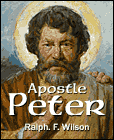 Available in book versions: paperback, PDF, and Kindle |
That grace is a gift is basic to our understanding of Christ's salvation.
Peter's testimony of God's grace at the Jerusalem Council helps clarify God's acceptance of the Gentiles. Without this vital understanding, the growth of Christianity would have been stunted and divided. But God uses Peter, holder of the keys of the kingdom, to help force open the door to salvation so that millions outside Judaism might come to Christ.
Prayer
Father, thank you for the grace of God that saves us! And thank you for people like Peter and Paul who contended for grace against the attacks of legalists. Help us, that your love can break through our prejudices to reach those whom you love. In Jesus' name, we pray. Amen.
Lessons for Disciples
- Peter's miraculous escape from Herod's secure prison teaches us that nothing is impossible with God (Acts 12:1-17, §10.1).
- When Peter appears at the door, the unbelief of the Christians gathered to pray for Peter's release exposes the lack of faith with which we often pray (Acts 12:12-17, §10.1).
- In Peter's First Epistle he teaches that trials help increase and refine our faith so that it is genuine (1 Peter 1:3-9; §10.2).
- Peter shows hypocrisy in Antioch when he avoids eating with the Gentiles when Judaizers from Jerusalem are present, to avoid upsetting them. He is wrong and is rebuked by the Apostle Paul. Even mature leaders can make errors; we need to be humble enough to accept correction when we are wrong (Galatians 2:11-14, §10.3).
- When the question of circumcision of Gentile converts is brought before the Council of Jerusalem, Peter's testimony about how God poured out his Spirit upon the Gentiles in Caesarea, showing that God accepted them, is key to deciding the issue (Acts 15:1-29, §10.4).
- At the Jerusalem Council and throughout his preaching and letters, Peter emphasizes salvation by grace through faith (Acts 15:9-11; 1 Peter 1:3-5; §10.5).
Key Verses
"In this you greatly rejoice, though now for a little while you may have had to suffer grief in all kinds of trials. These have come so that your faith -- of greater worth than gold, which perishes even though refined by fire -- may be proved genuine and may result in praise, glory and honor when Jesus Christ is revealed." (1 Peter 1:6-7, NIV)
"When I saw that they were not acting in line with the truth of the gospel, I said to Peter in front of them all, 'You are a Jew, yet you live like a Gentile and not like a Jew. How is it, then, that you force Gentiles to follow Jewish customs?'" (Galatians 2:11-14, NIV)
"We believe it is through the grace of our Lord Jesus that we are saved, just as they are." (Acts 15:11, NIV)
"In his great mercy he has given us new birth into a living hope through the resurrection of Jesus Christ from the dead, and into an inheritance that can never perish, spoil or fade-- kept in heaven for you, who through faith are shielded by God's power until the coming of the salvation that is ready to be revealed in the last time." (1 Peter 1:3b-5, NIV)
End Notes
[366] For more see H. W. Hoehner, "Herod," ISBE 2:696-697.
[367] Matthew 27:56; Mark 15:40; 16:1; Luke 24:10.
[368] "Squads of four soldiers each" (NIV), "squads" (ESV, NRSV), "quaternions" (KJV) is the plural noun tetradion, "a detachment/squad of four soldiers," one for each of four night watches (BDAG 1001).
[369] The KJV gives this as "Easter," but the Greek text specifies pascha, "Passover" (NIV, ESV, NRSV; (BDAG 784, 1).
[370] "Earnestly/earnest" (NIV, ESV), "fervent" (NRSV) is the adverb ektenōs, "pertaining to being persevering, eagerly, fervently, constantly" (BDAG 310).
[371] "Clutches" (NIV), "hand" (ESV, NRSV, KJV) is cheir, "hand," here, figurative, an acting agent, "hand (of)" (BDAG 1083, 2c).
[372] "Servant girl" (NIV, ESV), "maid" (NRSV), "damsel" (KJV) is the noun paidiskē, the diminutive of pais, "girl," in the New Testament always of the slave class, "female slave" (BDAG 749).
[373] "Out of your mind" (NIV, ESV, NRSV), "mad" (KJV) is present middle indicative of the verb mainomai, "be mad, be out of one's mind," here, "You're crazy," said to one who has brought incredible news (BDAG 610).
[374] Bruce, Acts, p. 253, fn. 14. See Matthew 18:10. Marshall (Acts, p. 222, f. 26) cites Hermann L. Strack and Paul Billerbeck, Kommentar zum Neuen Testament aus Talmud und Midrasch (1928), vol. 2, p. 707.
[375] "Brothers" (NIV, ESV, cf. KJV), "believers" (NRSV) is the plural of adelphos, "brother." The plural can also mean "brothers and sisters" (BDAG 18, 1).
[376] Galatians 1:19; 2:9; Acts 15:13; 21:18; 1 Corinthians 15:17. James is said to have been martyred during the time of Roman procurator Lucceius Albinus (ruled 62 to 64 AD; Josephus, Antiquities, 20.9.1; Eusebius, Ecclesiastical History, 2.23).
[377] Later, Herod Agrippa II (reigns 50-100 AD) rises to power. He and his sister Bernice hear the case of the Apostle Paul in Caesarea about 59 AD.
[378] The Greek verb is lypeō, which in the passive voice means "be sad, be distressed, grieve" (BDAG 604).
[379] "Trials" (NIV, NRSV) or "temptations" (KJV) is the Greek noun peirasmos, and can refer to either (1) a test or trial, or (2) a temptation or enticement to sin (BDAG 793). Here it is probably used in the general sense of test or trial.
[380] The Greek word used here is dokimazō, "to make a critical examination of something to determine genuineness, put to the test, examine" (BDAG 255-256).
[381] "Inexpressible" (NIV), "unspeakable" (KJV), or "indescribable" (NRSV) is the Greek adjective aneklalētos, a word which occurs only here in the New Testament, and "describes a joy so profound as to be beyond the power of words to express" (Grudem, 1 Peter, p. 66).
[382] "Full of glory" (KJV) or "glorious" (NIV, NRSV) is doxazō, the verbal form of the noun doxa, used throughout the Bible to describe the weightiness of God, the bright shining radiance of God's very presence.
[383] 2 Corinthians 1:22; 5:5; Ephesians 1:14.
[384] "Continued to increase" (NIV, NRSV), "increased" (ESV), "grew" (KJV) is the imperfect active of the verb auxanō, "to become greater, grow, increase," used three times in Acts of the word of God (Acts 6:7; 12:24; and 19:20; BDAG 151, 2). "Spread" (NIV), "multiplied" (ESV, KJV), "gain adherents" (NRSV) is the imperfect active of the verb plēthunō, "to increase greatly in number, grow, increase," also in Acts 6:1 (BDAG 826, 2).
[385] To be fair, we only have Paul's account of the incident. Perhaps there is more going on. F.F. Bruce observes: "The mid-forties witnessed a revival of militancy among Judaean freedom-fighters.... In the eyes of such militants, Jews who fraternized with the uncircumcised were not better than traitors, and the leaders of the Jerusalem church may have felt themselves endangered by the reports of Peter's free-and-easy conduct at Antioch. Whatever the precise terms of the message were, Peter took it seriously enough to discontinue eating with Gentile Christians -- for the time being at least" (Bruce, Peter, pp. 35-36).
[386] Bruce comments (Peter, p. 37), "It seems more probable to me that the Council of Jerusalem was held as a sequel to the confrontation at Antioch, and that an attempt to impose its decree on Pauline churches was made rather later, and possibly in Peter's name."
[387] Genesis 9:4; Leviticus 7:26-27; 17:10-13; Deuteronomy 12:16, 23-24.
[388] J. D. G. Dunn, Unity and Diversity in the New Testament (London, 1977), p. 385, cited by F. F. Bruce, Peter, pp. 42-43.
[389] "Purified" (NIV) is katharizō, "cleanse," here, of moral and cultic cleansing, "cleanse, purify" from sin (BDAG 488, 3bα).
Copyright © 2025, Ralph F. Wilson. <pastor![]() joyfulheart.com> All rights reserved. A single copy of this article is free. Do not put this on a website. See legal, copyright, and reprint information.
joyfulheart.com> All rights reserved. A single copy of this article is free. Do not put this on a website. See legal, copyright, and reprint information.

|

|
In-depth Bible study books
You can purchase one of Dr. Wilson's complete Bible studies in PDF, Kindle, or paperback format -- currently 48 books in the JesusWalk Bible Study Series.
Old Testament- Abraham, Faith of
- Jacob, Life of
- Moses the Reluctant Leader
- Joshua
- Gideon
- David, Life of
- Elijah
- Psalms
- Solomon
- Songs of Ascent (Psalms 120-134)
- Isaiah
- 28 Advent Scriptures (Messianic)
- Daniel
- Rebuild & Renew: Post-Exilic Books
Gospels
- Christmas Incarnation (Mt, Lk)
- Sermon on the Mount (Mt 5-7)
- Luke's Gospel
- John's Gospel
- Seven Last Words of Christ
- Parables
- Jesus and the Kingdom of God
- Resurrection and Easter Faith
- Apostle Peter
Acts
Pauline Epistles
- Romans 5-8 (Christ-Powered Life)
- 1 Corinthians
- 2 Corinthians
- Galatians
- Ephesians
- Philippians
- Colossians, Philemon
- 1 & 2 Thessalonians
- 1 &2 Timothy, Titus
General Epistles
Revelation
Topical
